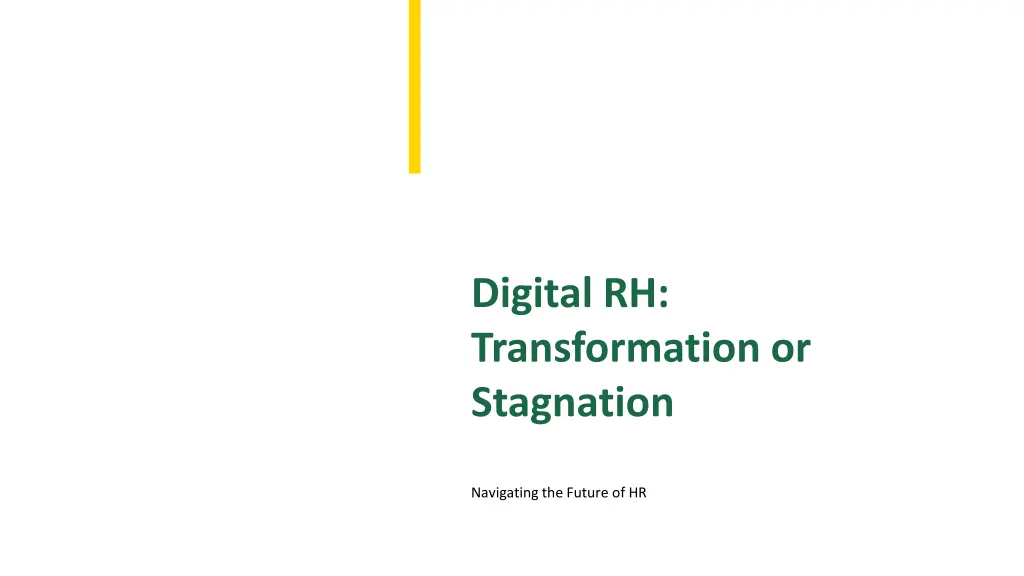
Navigating the Future of HR Digital Transformation
Explore the essential aspects of HR digital transformation, including understanding digital tools, overcoming resistance to change, and leveraging technology for HR empowerment. Discover how to navigate the digital dilemma to avoid stagnation and prepare for the future of HR effectively.
Download Presentation

Please find below an Image/Link to download the presentation.
The content on the website is provided AS IS for your information and personal use only. It may not be sold, licensed, or shared on other websites without obtaining consent from the author. If you encounter any issues during the download, it is possible that the publisher has removed the file from their server.
You are allowed to download the files provided on this website for personal or commercial use, subject to the condition that they are used lawfully. All files are the property of their respective owners.
The content on the website is provided AS IS for your information and personal use only. It may not be sold, licensed, or shared on other websites without obtaining consent from the author.
E N D
Presentation Transcript
Digital RH: Transformation or Stagnation Navigating the Future of HR Photo by Pexels
01 The Digital Dilemma Table of Contents 02 Understanding Digital Transformation 03 The Role of Technology 04 Overcoming Resistance to Change 05 Measuring Success 06 Case Studies: Success Stories 07 Addressing Concerns of Stagnation 08 The Human Element 09 Preparing for the Future 10 Thank You!
1 The Digital Dilemma Choose Your Path In today's fast-paced world, HR faces a crucial decision: embrace digital transformation or risk stagnation in effectiveness. Digital tools can enhance recruitment, employee engagement, and performance management by streamlining processes and providing insights. Stagnation results in missed opportunities for organizations to innovate and adapt to changing workforce dynamics and demands. The choice reflects a broader organizational mindset towards embracing technology and fostering a culture of change. Photo by Pexels
2 Understanding Digital Transformation A Necessity, Not an Option Digital transformation in HR is not just about technology; it's about fundamentally reorganizing how HR functions and delivers value. It involves integrating digital tools that facilitate decision- making, communication, and collaboration across all HR activities. Leaders must be proactive in adapting to these changes to build a resilient workforce that thrives in the digital age. Failure to do so may render traditional HR practices obsolete in the face of emerging trends. Photo by Pexels
3 The Role of Technology Empowering HR Functions Technology plays a vital role in transforming HR, providing tools like AI and data analytics to enhance decision-making. These tools can predict workforce trends, identify talent gaps, and personalize employee experiences based on data insights. The shift towards an employee-centric experience will drive higher satisfaction, engagement, and retention rates. Leveraging technology effectively positions HR as a strategic partner within the organization. Photo by Pexels
4 Overcoming Resistance to Change Embracing New Mindsets Resistance to change is common; HR must champion the digital transformation by leading with a clear vision and strategy. Engaging employees in the process through training and open communication fosters a culture of adaptability and innovation. Celebrating small wins encourages buy-in and demonstrates the value of embracing digital changes. Addressing concerns and misconceptions is essential in overcoming barriers to transformation. Photo by Pexels
5 Measuring Success Key Performance Indicators Successful HR transformation requires clear metrics to measure the effectiveness of digital initiatives effectively. KPIs may include employee engagement scores, time to hire, and productivity levels, all reflecting the impact of digital tools. Regular assessments ensure continuous improvement, creating a feedback loop that drives further innovation in HR practices. Monitoring these indicators solidifies the link between technology and business performance in HR. Photo by Pexels
6 Case Studies: Success Stories Learning from Leaders Several organizations have successfully navigated their digital transformation journeys, showcasing the benefits of embracing technology. Case studies reveal improvements in talent acquisition, employee satisfaction, and overall organizational agility post- transformation. Learning from these examples can provide guidance and inspirationfor those ready to embark on their own journey. Success stories demonstrate the tangible ROI of investing in HR digital solutions. Photo by Pexels
7 Addressing Concerns of Stagnation What Happens When We Wait? Stagnation can lead to decreased employee morale, increased turnover, and inability to attract top talent in a competitive market. Organizations that resist digital transformation ultimately fall behind, losing their competitive edge and market relevance. As talent demands evolve, companies must evolve with them to maintain a robust workforce. Being proactive in digital transformation helps avert potential pitfalls associated with stagnation. Photo by Pexels
8 The Human Element Balancing Tech with Touch While technology is crucial, the human element in HR must not be overlooked; empathyand understanding are essential. Digital HR should enhance, not replace, the personal connections between employees and HR practitioners. Training and development initiatives must remain a priority, ensuring employees feel valued and invested in. Striking this balance leads to a more engaged and motivated workforce. Photo by Pexels
9 Preparing for the Future A Roadmap to Success As we look ahead, HR must be agile, ready to adapt strategies and tools to evolving workforce needs and expectations. Future HR leaders will be those who embrace innovation and foster a culture of continuous learning and improvement. Building a roadmap that incorporates stakeholder feedback ensures a collaborative approach to transformation. Being future-ready is essential for HR to maintain relevance and effectiveness. Photo by Pexels
10 Thank You! Your Engagement Matters Thank you for participating in this presentation on digital transformation in HR! Your insights and questions are valuable for shaping the future of HR practices. Let s work together toward a digitally empowered and agile HR future. Together, we can embrace transformation and avoid stagnation! Photo by Pexels
